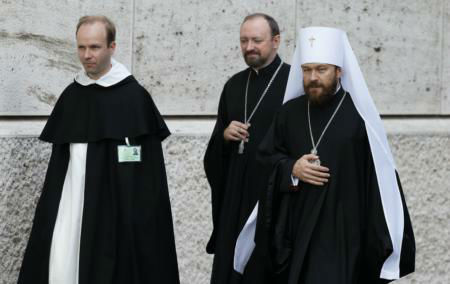Ecumenism and Russian state power
Metropolitan Hilarion of Volokolamsk, head of the Russian Orthodox Church's department of external relations and a frequent visitor to the West, is a young man of parts: a widely-published author; a composer; a gifted linguist. He can be charming and witty, as I discovered during two hours of conversation at the Library of Congress in 2011; and in the intervening years he's positioned himself and his Church as defenders of traditional Christian values in a world threatened by Western decadence.
There's a serious problem, however: Metropolitan Hilarion does not always speak the truth.
In the year since the Maidan "revolution of dignity" broke out in Ukraine, Hilarion has gone out of his way to attack the Greek Catholic Church of Ukraine, charging that this largest of the Eastern Catholic Churches has been a partisan political actor; that its priests have fomented violence; and that Ukrainian Greek Catholics have been working to keep Ukrainian Orthodoxy divided. These are calumnies, for the charges are demonstrably false: the Greek Catholic Church in Ukraine has been a voice for national moral renewal and reconciliation; its priests have risked their lives to aid men and women of all confessions; and the Greek Catholic leadership has worked within the country's established ecumenical structures to forge a united religious voice for a Ukraine that is free and prosperous, rid of the corruptions that have bedeviled it for decades.
In our Washington conversation, Metropolitan Hilarion would not even concede that the forced liquidation of the Ukrainian Greek Catholic Church in 1946 was an act of thuggery perpetrated by Stalin's secret police. Rather, he defended the bogus "L'viv Sobor [Council]" in the name of Orthodox prerogatives he evidently believes are threatened by Eastern-Rite Churches in full communion with Rome. That visceral disdain for the very existence of the Greek Catholic Church of Ukraine has also been on public display this past year.
So what happens? Hilarion is invited to the recent Synod in Rome, where he used part of his time addressing the representatives of global Catholicism to repeat his lies about the activity of the Greek Catholic Church in Ukraine and his contempt for that martyr-Church.
This is unacceptable. For the past year, Metropolitan Hilarion and his master, Patriarch Kirill of Moscow and All Russia, have functioned as agents of Russian state power in matters having to do with Ukraine. Which is to say, they have functioned as agents of Vladimir Putin. I take it as axiomatic that serious ecumenical dialogue is impossible when the dialogue-partner operates under ambiguous or false pretenses and uses the dialogue to advance political interests. Yet that is the charade that is allowed to continue when Hilarion is welcomed in Rome. Indeed, the charade is reinforced.
Major-Archbishop Sviatoslav Shevchuk of the Ukrainian Greek Catholic Church has suggested that Hilarion's aggressive and offensive intervention at the Synod damaged the Russian Orthodox Church. That may be. But inviting Hilarion to participate in the Synod, after a year of lies about the courageous efforts of the Greek Catholic Church in Ukraine to support a moral revolution in that hard-pressed land, was a self-inflicted wound on the part of the Holy See. It is now past time to re-examine the default positions in the Vatican Secretariat of State, and at the Pontifical Council for Promoting Christian Unity that permitted Hilarion to lie in the Synod hall and to call into question the integrity of the Greek Catholic Church of Ukraine as an ecclesial community.
No "dialogue" is worth the appeasement of aggression abetted by falsehood. Nothing is accomplished in terms of moderating Russian Orthodoxy's historic deference to Russian state power (be that czarist power, communist power, or the "managed democracy" of Mr. Putin) by giving Hilarion a platform like the Synod. And despite the fantasies of some Western pro-life and pro-family activists, there is nothing to be gained for those great causes in tandem with the current leadership of Russia, or of Russian Orthodoxy.
Stemming and then reversing the tide of Western decadence cannot be done by compromises with the truth.
George Weigel is Distinguished Senior Fellow of the Ethics and Public Policy Center in Washington, D.C.
- George Weigel is Distinguished Senior Fellow of the Ethics and Public Policy Center in Washington, D.C.



















